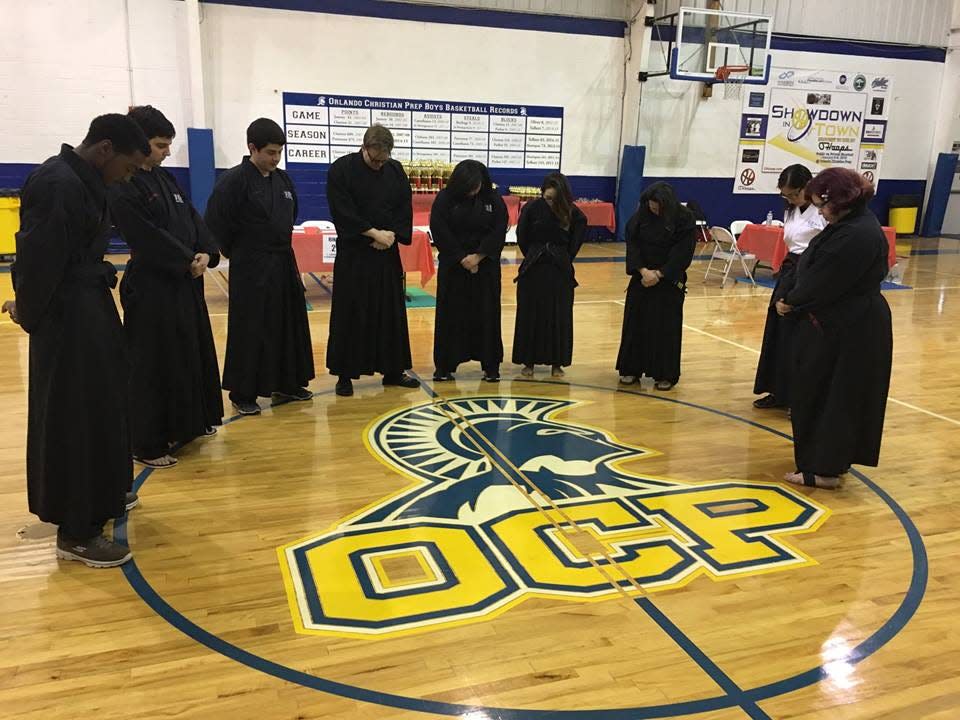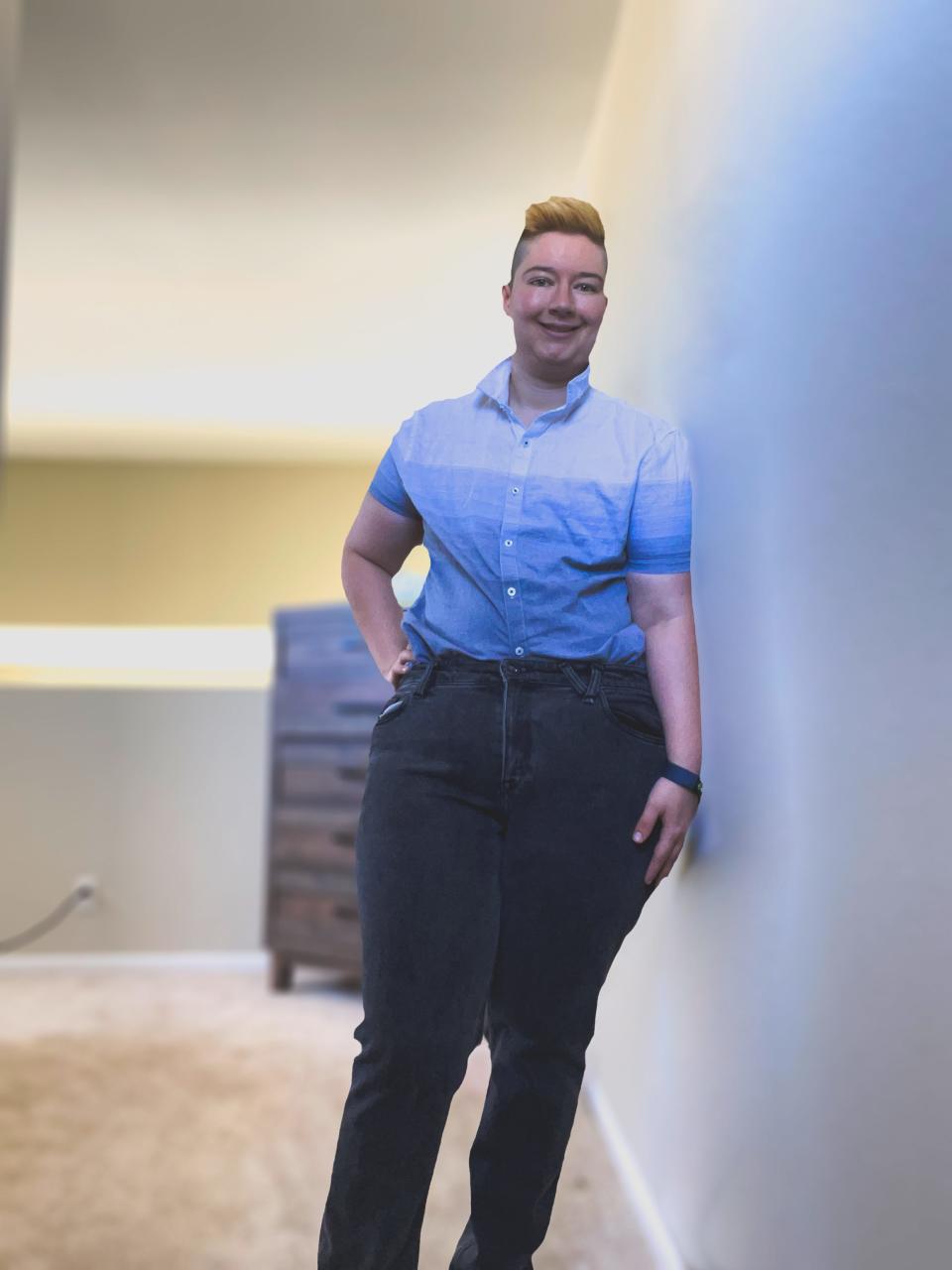Martial arts, activism and art: For young people, spiritual journeys are venturing away from religion
When Jordan Booker, 22, found himself dealing with anxiety and overthinking, meditation proved a powerful salve. The activity offered the University of Houston junior spiritual benefits he hadn't found while growing up in a Christian family.
Two years ago, Booker started a Monday meditation group on campus, eager to see whether the activity might be similarly helpful for others. Before long, dozens of other young people were joining him for weekly "Meditation Monday" sessions to reflect on their lives and find inner peace.
“We're starting to see that there's not just one way to have spirituality," Booker said.
Across the United States, teenagers and young adults are increasingly expanding or redefining their spiritual practices around non-traditionally religious activities rather than around a single institution or faith system, according to a recent survey. The findings come as more Americans, especially Gen Zers and millennials, are pulling away from Christian faith systems and describing themselves as agnostics, atheists or “nothing in particular."
The survey results collected by Springtide Research Institute, a nonpartisan institute based in Bloomington, Minnesota, examined the spiritual lives of those aged 13 to 25, roughly the span of Generation Z. The report titled, “The State of Religion and Young People 2021: Navigating Uncertainty,” found that when asked what activities they pursued as a religious or spiritual practice, young people were likelier to engage with art (53%) than prayer (45%); more likely to seek out nature (45%) or do yoga or martial arts (40%) than study a religious text (28%); and more likely to practice meditation (29%) than participate in religious groups (25%).
Millennials, ages 26 to 41, are the most likely generation to not believe in God or to describe their faith as "nothing in particular," with about four in 10 taking that position, according to a Pew Research Center survey conducted in 2018 and 2019. A similar percentage of Generation Z falls into that category, according to Springtide's survey findings.
Josh Packard, Springtide’s executive director, said that even though young people may not access religious institutions, that doesn’t mean they have stopped grappling with fundamental human questions.
“They’re still trying to find answers,” he said. “This generation is in a constant state of exploration.”
While individuals have always defined their own spirituality, what’s new, Packard said, is that young people are explicitly claiming these other activities as part of their religious or spiritual practices.
“In interviews, we would hear things like, ‘The art that I create helps connect me to my Catholic faith,’” he said.
'Kids don’t seem to want the tradition'
LaTanya Lane, director of the Interfaith Leadership Institute (IFYC) in Chicago, said she’s seen similar trends among the youth she works with as part of her work to unite people from diverse religious backgrounds toward positive social change.
“Young people are in this real wild time where a lot of institutions and seemingly strong unshakeable things are in disruption, so it makes sense that they’re being creative in their meaning-making,” she said.
Defining one’s faith is an individual endeavor, Lane said, and people often combine disparate elements to create their own faith practice. For instance, she said, her grandmother was a practicing Christian but incorporated elements of African spirituality.
“My grandma would have been mortified if I had pointed that out,” Lane said, but on the other hand, “young people feel empowered to say that now – to say, 'This is the feeling I get when I’m doing martial arts.' The stigma around this broader view of what spirituality means is lessening.”

Joe Morejon of Black Belts for Christ in Orlando, Florida, runs his dojo as a youth ministry steeped in Japanese martial-arts tradition, with each judo and jujitsu class beginning and ending with prayer. Most of his students are young teens and pre-teens.
“Samurai served one lord, one master, ready to give up their lives – and as Christians it’s the same thing,” he said. “The Bible says to live a life of service, instead of being self-centered.”
Morejon said that while some members of the traditional Christian community have expressed misgivings about using martial arts in the service of the gospel, “we back everything we do with Scripture,” and that seems to work for his young students.
“Everyone has their own path to God,” he said. “I tell students, we’re all climbing the same mountain. You just have to find your path.”
Many students in his classes, Morejon said, have become disillusioned with turn-the-other-cheek Christian teachings they see as too passive and unfit for a real world that regularly kicks them in the teeth.
Instead, he said, “there’s a grit in what we teach.” He shares Bible verses such as, “Blessed by the Lord my strength, which teaches my hands to war, and my fingers to fight.”
“They go, ‘That’s from the Bible?’ I say, ‘Yes – Psalm 144: 1. We’re teaching them that meekness is not weakness. Meekness is strength that is reserved.
“Kids don’t seem to want the tradition, to go to the church potluck and sing kumbaya,” he said. “They’re not looking at spirituality like their parents or grandparents. They’re looking for a more immersive experience.”
'Something for the greater good'
Packard said the trends illustrated by the survey predate the pandemic but were accelerated by social restrictions that forced traditional institutions to redefine how they reached their communities.
“Before, if you asked a church or a synagogue, what do you do, the answer would be something like, ‘Well, we transform souls,’” Packard said. “But when the pandemic came along, it was like they realized, ‘Oh. We put on events.’ It has forced the issue.”
The 2021 survey, which polled 10,274 members of Generation Z, was conducted with pandemic stresses in mind. While three of four respondents described themselves as religious or spiritual, the survey found that in stressful or uncertain times, just 16% turned to faith communities for relief – the same percent who answered “no one.”
Instead, they said they were more likely to seek out friends or practice hobbies like sports or baking.
While nearly half of respondents expressed belief in a higher power, about three in 10 said they did not or doubted the existence of a higher power more than they believed.
A 2021 Pew survey of the general population found that while 63% of Americans still describe themselves as Christian, their portion of the overall population dropped 12% from 2011 to 2021. Meanwhile, 29% of American adults described themselves as religious “nones,” meaning atheist, agnostic or “nothing in particular,” up from 17% in 2009.
According to Pew data collected in 2018 and 2019, the percentage of Christian millennials fell 16%, while those describing themselves as atheist, agnostic or unaffiliated rose by 13%, both changes twice that of any other age group.
“With millennials, there’s an overarching distrust in most institutions – schools, the government, churches – that haven’t functioned that well for them,” said Almeda Wright, an associate professor of religious education at Yale Divinity School in New Haven, Connecticut.
With many of their parents undergoing similar doubts, more young people are being raised without formal religious experience. Consequently, "institutions are not seen as the primary curators of these communal practices anymore,” Wright said.
As they search for meaning, young people feel at ease with the idea of explicitly claiming nontraditional religious activities as part of their spiritual practice.
Wright, author of the 2017 book, “The Spiritual Lives of Young African Americans,” said the teens she spoke with were involved in things like activism and writing poetry, “and while none said, ‘I’m doing this as a religious person,’ there were lots of religious themes. It’s not explicitly religious but there’s a sense of spirituality to it all, of experiencing the divine in all these spaces.”
Wright said the young Black people she works with are still embedded in their congregations, not as detached as other demographics from traditional church settings. But even as some disconnect, it doesn’t mean they aren’t still practicing prayer or meditation in their own ways: Some seek online sources of spiritual inspiration or guidance such as @blackliturgies, an Instagram account described as “a space for Black spiritual words of liberation, lament, rage and rest” and published by author Cole Arthur Riley.
“She’s a millennial curating very traditional prayers from an Episcopal tradition in snippy, meme-able ways,” Wright said.
Gretel Van Wieren, a religious studies professor at Michigan State University in East Lansing, Michigan, said she’s seeing similar trends among her students. Van Wieren teaches a course on religion and the environment that invites pupils to explore notions of spirituality beyond conventional understandings of religion and faith.
“Students today, whether they adhere to a particular religious tradition or not, appear to be increasingly comfortable with the view that spirituality can be found in a wide range of practices,” Van Wieren said.
Along with late Yale social ecologist Stephen Kellert, Van Wieren published a 2013 study that found that children who spent significant amounts of time outdoors expressed feelings of solace, peacefulness, happiness and a sense of divine presence or mystery. While the study focused on young children, other research has reflected similar findings for youth and adults, Van Wieren said.
The social restrictions of COVID-19 “definitely played a role” in accelerating young people's search for spiritual fulfillment in nontraditional places, Van Wieren said.
“The pandemic forced faith communities to figure out ways to connect outside of traditional, face-to-face gatherings, which often meant meeting online or even outdoors,” she said. “For some, this opened up new avenues for thinking about what sacred practices actually look like and entail.
“My sense is that young people today are increasingly willing to look to a variety of sources to answer these questions.”
While Booker, of the University of Houston, finds spiritual fulfillment in meditation, he sees the activity not as a replacement for traditional religion, but as more of a supplement. He remains involved in his family church since his father is a nondenominational Christian minister.
“It’s like a dessert,” said Booker, who is also a member of the university's track and field squad. “It shouldn’t be, ‘I meditated and I’m good with life.’ It should be, ‘I meditated, but I should also be in The Word.’ It’s not the main course; it’s an add-on.”
At the same time, he said, young people are eager to define their spirituality for themselves.
“We want to find our own (sense of) being, without being told what to do.” he said.

Blake Matthews, a 22-year-old sophomore psychology major at Arizona State University, said he wasn’t surprised by Springtide's survey findings, especially as a trans male. For many in the LGBT community, he said, “religious trauma” imposed by elders has been a common theme in their experience.
“I can’t tell you how many times I’ve been told I’m going to hell because I’m trans,” said Matthews, a communications officer for BeYouASU, an LGBT-focused club at the university with 700 members.
“Religion has consistently been forced on us, where the older generations are telling us, ‘Just read the Bible, you’ll feel better and your problems will go away,’ but that’s just not true,” said Matthews, 22. “As a result, Generation Z and younger people who want to have some form of spirituality find it in other ways because we’re forced to. We’re wanting to be spiritual but not wanting to be shamed about who we are.”
Instead, he said, he and many of his peers -- even those who still embrace traditional religion -- are pursuing meditation, yoga, going on hikes or even something as simple as watching a sunset for spiritual fulfillment.
“It's doing something they feel connects them to the present moment," he said. "A lot of us are starting to realize that spirituality is so much more than praying every day."
This article originally appeared on USA TODAY: Spirituality: For young people, that now includes yoga, arts and more

